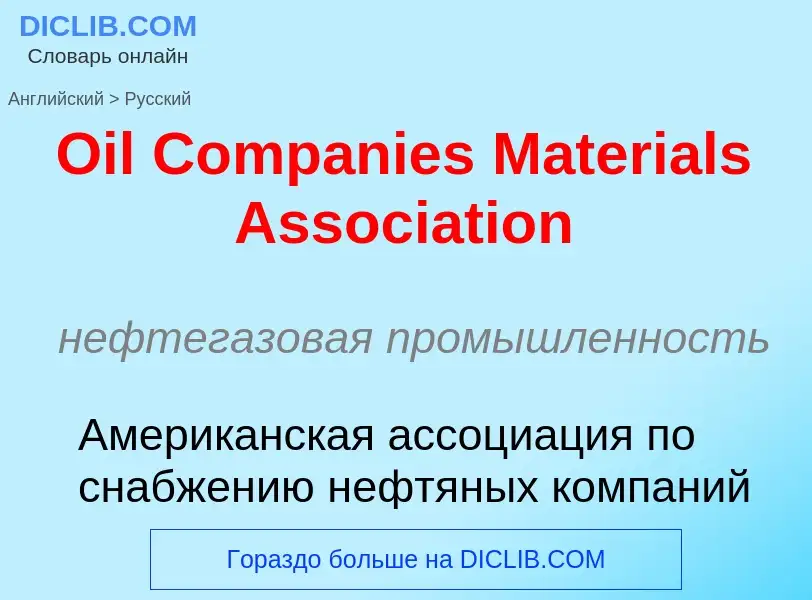Μετάφραση και ανάλυση λέξεων από την τεχνητή νοημοσύνη ChatGPT
Σε αυτήν τη σελίδα μπορείτε να λάβετε μια λεπτομερή ανάλυση μιας λέξης ή μιας φράσης, η οποία δημιουργήθηκε χρησιμοποιώντας το ChatGPT, την καλύτερη τεχνολογία τεχνητής νοημοσύνης μέχρι σήμερα:
- πώς χρησιμοποιείται η λέξη
- συχνότητα χρήσης
- χρησιμοποιείται πιο συχνά στον προφορικό ή γραπτό λόγο
- επιλογές μετάφρασης λέξεων
- παραδείγματα χρήσης (πολλές φράσεις με μετάφραση)
- ετυμολογία
Oil Companies Materials Association - translation to ρωσικά
нефтегазовая промышленность
Американская ассоциация по снабжению нефтяных компаний
сокращение
[Oil Companies Materials Association] Американская ассоциация по снабжению нефтяных фирм
[mə'ti(ə)riəlzsaiəns]
специальный термин
материаловедение
наука о материалах
Ορισμός
Βικιπαίδεια
Big Oil is a name used to describe the world's six or seven largest publicly traded and investor-owned oil and gas companies, also known as supermajors. The term, particularly in the United States, emphasizes their economic power and influence on politics. Big Oil is often associated with the fossil fuels lobby and also used to refer to the industry as a whole in a pejorative or derogatory manner.
Sources conflict on the exact makeup of Big Oil today, though the companies which are most frequently mentioned as supermajors are ExxonMobil, Chevron, BP, Shell, Eni and TotalEnergies, with ConocoPhillips frequently being included as well prior to spinning off its downstream operations into Phillips 66.The phrase "Super-Major" emanated from a report published by Douglas Terreson of Morgan Stanley in February 1998. The report foretold a substantial consolidation phase of "Major" Oil companies which would result in a group of dominant "Super-Major" entities. Big Oil previously referred to seven oil companies which formed the Consortium for Iran; such "Seven Sisters" were the Anglo-Persian Oil Company (a predecessor of BP), Shell plc, three of Chevron's predecessors (Standard Oil of California, Gulf Oil and Texaco), and two of ExxonMobil's predecessors (Jersey Standard and Standard Oil of New York).
The term, analogous to others such as Big Steel, and Big Tech, and Big Pharma which describe industries dominated by a few giant corporations, was popularized in print from the late 1960s. Today it is often used to refer specifically to the seven supermajors. The use of the term in the popular media often excludes the national producers and OPEC oil companies who have a much greater global role in setting prices than the supermajors. China's two state-owned oil companies, Sinopec and the China National Petroleum Corporation, as well as Saudi Aramco, had greater revenues in 2022 than any investor-owned oil company.
In the maritime industry, six to seven large oil companies that decide a majority of the crude oil tanker chartering business are called "Oil Majors".


![[[Buckminsterfullerene]] nanostructure [[Buckminsterfullerene]] nanostructure](https://commons.wikimedia.org/wiki/Special:FilePath/Buckminsterfullerene-perspective-3D-balls.png?width=200)



![solid state physics]]”. solid state physics]]”.](https://commons.wikimedia.org/wiki/Special:FilePath/Google Ngram Viewer diagram on complex matter terminology.png?width=200)
![The iridescent [[nacre]] inside a [[nautilus]] shell The iridescent [[nacre]] inside a [[nautilus]] shell](https://commons.wikimedia.org/wiki/Special:FilePath/NautilusCutawayLogarithmicSpiral.jpg?width=200)




![Wire rope made from [[steel]] alloy Wire rope made from [[steel]] alloy](https://commons.wikimedia.org/wiki/Special:FilePath/Steel wire rope.png?width=200)
![A late [[Bronze Age sword]] or dagger blade A late [[Bronze Age sword]] or dagger blade](https://commons.wikimedia.org/wiki/Special:FilePath/Sword bronze age (2nd version).jpg?width=200)
